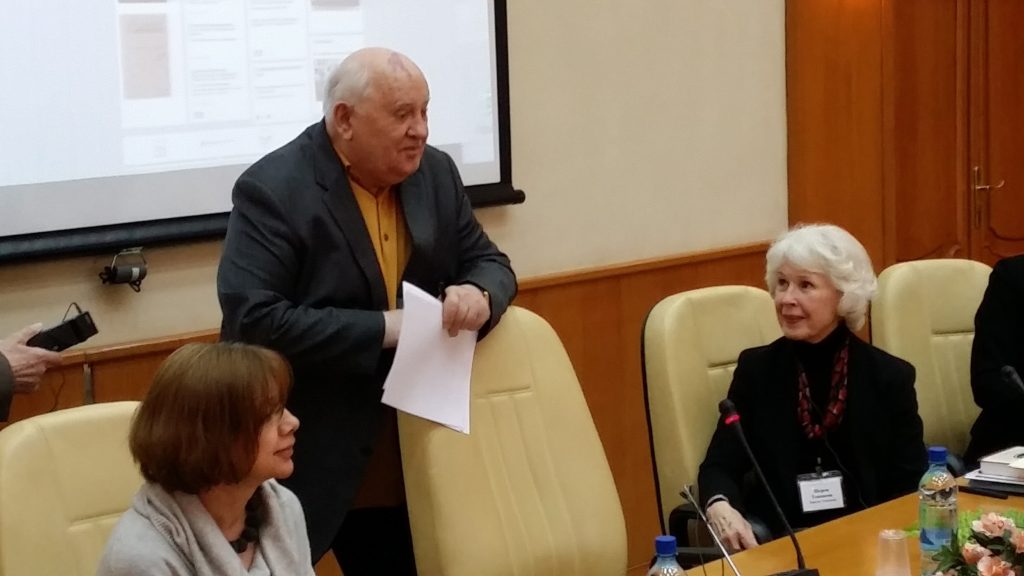
As this months marks the 30th anniversary of the attempted coup against Mikhail Gorbachev in August of 1991, Gorbachev has published a long essay on his policy of perestroika (reform) in the journal Russia in Global Affairs. You can read it in English here. As some readers may be aware. unlike in the west, Gorbachev is not necessarily well-liked among Russians. Many consider his policies to have paved the way for the chaos of the 1990’s. In my conversations with Russians during my 2017 trip, in which I asked about their views of various Soviet leaders, most had either negative or indifferent views about him, while 2 or 3 expressed some degree of positive views.
Here is an interesting except from Gorbachev’s essay:
Initially, political reform was not our objective. I acknowledge that, at the time, I believed that the Party—the Communist Party of the Soviet Union—would be the vehicle of reform. For many years, it had been managing the country’s affairs; its representatives had vast administrative and political experience and held key positions in all areas of government and society. Therefore, the Party, particularly during the initial stage of perestroika, played an indispensable role. Plenary sessions of the Central Committee convened regularly, and all my reports were approved at Politburo meetings, often after sharp debate, which became increasingly contentious as tensions and differences of opinion came to the fore.
This was the drama of perestroika. Millions of Party members and many Party leaders in central bodies and local organizations supported new policies. But as I traveled and talked to people, I increasingly felt that the energy of change was hitting the wall erected by the Party and government bureaucracy—the nomenklatura.
People were wondering: Where is perestroika? Why are the most basic issues not being addressed? Why do our leaders’ attitudes toward the needs and concerns of the people remain unchanged?
In the fall of 1986, we concluded that we need to convene a plenary meeting of the Central Committee to discuss personnel policies. The plenum, held in January 1987, resonated tremendously in the Party, throughout the country and around the world. For the first time, we recognized the responsibility of the CPSU, its Central Committee and the Politburo for the strategic mistakes that had led our country into social and political stagnation. A large part of the nomenklatura saw the ideas and decisions of the plenum as a threat to themselves and moved to sabotage perestroika.
In 1987, the struggle between the reformers and the anti-reform wing of the CPSU began in earnest. It was pervasive, and it was weakening the Party’s ability to manage the country’s affairs and its legitimacy within Soviet society. My like-minded supporters and I realized then that unless we truly involved the country’s citizens in the processes of renewal and decoupled the Party from political power, the policy of perestroika would hit a dead end. We became aware of the need for political reform.
Paul Robinson has written an interesting piece, partly inspired by some other recent comments by Gorbachev, about the different opinions about who is to blame for the collapse of the Soviet Union which – whether one thinks it was a good or bad thing in the long run – created major tumult and instability:
It suits most people to blame Gorbachev; if it was all his fault, everybody else is off the hook. On the other hand, were communist hardliners to blame, you can argue the problem was that Gorbachev failed to reform fast enough, and this suits liberals. But if it was Yeltsin and the liberal reformers around him who were responsible, you can argue their successors today are unfit to run the country, having dragged it into ruin once already.
So, what’s the truth?
Gorbachev is right to remind people of the situation when he took power in 1985. The Soviet model had reached the limits of its potential. Central state planning was incapable of responding effectively to the demands of a modern, high-tech economy. Social problems such as absenteeism, alcoholism and crime were on the rise. There was a growing sense that something had to be done.
The Soviet leader’s problem was that he never had a very good idea of what that something should be. At heart, he was a true communist believer, who felt that all one needed to do was liberate people and they would work constructively towards improving the existing system. His attitude was similar to that of one of his closest advisors, Alexander Yakovlev, who remarked, “It seemed to me that it was enough to remove the machinery of repression … and all would be well.”
Gorbachev was not merely naïve, he was also economically clueless. American academic Graham Allison was shocked at a meeting held to discuss economic reform by the “dumb questions” Gorbachev asked. The Soviet leader could never overcome his suspicion of private property and opted for a form of “market socialism” that kept business under state control but gave enterprises more freedom from central planning authorities. The policy undermined whatever advantages central planning provided without giving any of the benefits of the free market. It accelerated economic collapse.
When people responded to Gorbachev’s reforms in a less than constructive fashion, he blamed hardliners in the party for obstructing him. He then set about dismantling the power of the Communist Party. But the party was the primary institution regulating Soviet society. When Gorbachev undermined it, there was nothing to replace it. The result was anarchy.
Read the full article here.